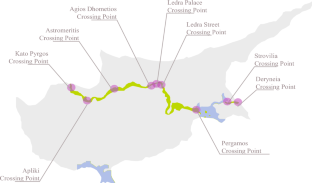在有争议的空间中建立场所过程的成功标准:对尼科西亚莱德拉街过境点非政府组织的评估
IF 16.4
1区 化学
Q1 CHEMISTRY, MULTIDISCIPLINARY
引用次数: 0
摘要
作为分裂的首都,尼科西亚及其缓冲地带自1974年塞浦路斯分裂以来一直受到政治、社会、文化和学术领域的关注。缓冲区的实际存在和象征性存在反映了正在进行的争取统一的斗争和有限空间内紧张局势的挑战。缓冲区的过境点充当桥梁,促进社区之间的行动和互动。因此,有争议的空间需要全面的、对环境敏感的方法,以促进包容性对话,并寻求创新的空间安排,以促进可持续和平和共同理解。本文提出了一种场所制作过程方法,作为一种变革性的工具来解决与有争议的空间相关的困难,并努力实现它们的全面振兴。126个不同的非政府组织作为利益相关者参与了莱德拉街过境点,并在信度检验后回答了李克特量表调查。本文的目的是为有争议的空间确定一个成功的场所制作过程图作为分析框架。该图建立了重要的标准和它们之间的相关性。它将社交性与使用和活动一起确定为在有争议的环境中成功创建场所的关键要素:社交网络、共享空间使用、多功能和公共空间使用。本文章由计算机程序翻译,如有差异,请以英文原文为准。

Successful criteria for placemaking process in contested spaces: evaluation of non-governmental organisations at Ledra Street Crossing Point in Nicosia
As adivided capital city, Nicosia and its Buffer Zone have attracted attention across political, social, cultural, and academic spheres since the 1974 division of Cyprus. The Buffer Zone's physical and symbolic presence reflects the ongoing struggle for reunification and the challenges of tension in a confined space. The crossing points in the Buffer Zone serve as bridges, facilitating movement and interaction between the communities. Thus, contested spaces require comprehensive, context-sensitive approaches that foster inclusive dialogues, and seek innovative spatial arrangements to promote sustainable peace and shared understanding. The paper proposes a placemaking process approach that serves as a transformative tool to tackle the difficulties associated with contested spaces and strive towards their comprehensive revitalisation. 126 different NGOs participated as stakeholders in the Ledra Street Crossing Point and answered the Likert scale survey after the reliability check. The aim of this paper is to identify a successful placemaking process diagram for contested spaces as an analytical framework. The diagram establishes important criteria and their correlations for the placemaking process. It identifies sociability alongside uses and activities as key imperatives for successful placemaking process in contested contexts: social networks, sharing space use, multifunctionality, and public space usage.
求助全文
通过发布文献求助,成功后即可免费获取论文全文。
去求助
来源期刊

Accounts of Chemical Research
化学-化学综合
CiteScore
31.40
自引率
1.10%
发文量
312
审稿时长
2 months
期刊介绍:
Accounts of Chemical Research presents short, concise and critical articles offering easy-to-read overviews of basic research and applications in all areas of chemistry and biochemistry. These short reviews focus on research from the author’s own laboratory and are designed to teach the reader about a research project. In addition, Accounts of Chemical Research publishes commentaries that give an informed opinion on a current research problem. Special Issues online are devoted to a single topic of unusual activity and significance.
Accounts of Chemical Research replaces the traditional article abstract with an article "Conspectus." These entries synopsize the research affording the reader a closer look at the content and significance of an article. Through this provision of a more detailed description of the article contents, the Conspectus enhances the article's discoverability by search engines and the exposure for the research.
 求助内容:
求助内容: 应助结果提醒方式:
应助结果提醒方式:


